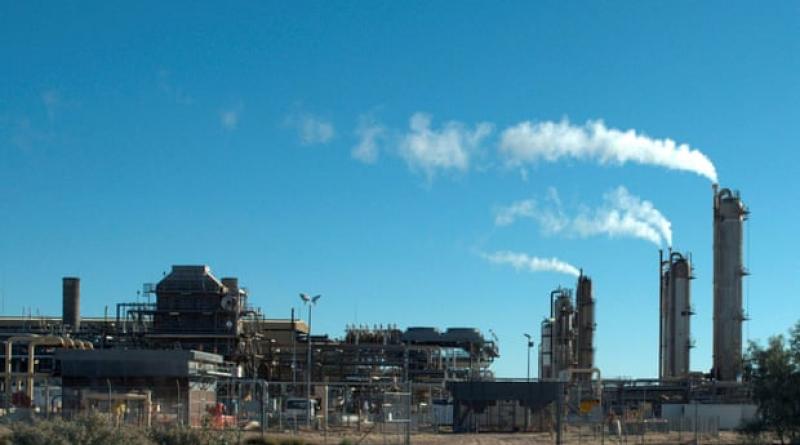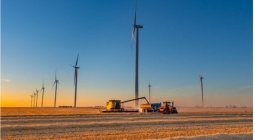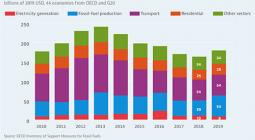Gas ‘completely dominated’ discussion about Covid-19 recovery, commission adviser says.

Focus should shift to renewables to avoid risk of being stranded with fossil fuel infrastructure, AMWU national secretary says.
A member of a government Covid-19 recovery taskforce has rejected the overwhelming focus on gas as the path out of recession, saying the country risked ending up with stranded fossil fuel infrastructure and should be doing more to back renewable energy.
Paul Bastian, national secretary of the Australian Manufacturing Workers Union and a member of a manufacturing taskforce advising the federal government’s handpicked National Covid-19 Coordination Commission (NCCC), said gas had a significant role to play, but the importance of cheap clean energy in cutting costs for industry had barely featured in public discussion when it should be “front and centre”.
Bastian declined to comment directly on a leaked draft report by the manufacturing taskforce, revealed by Guardian Australia last month, that recommended the Morrison government underwrite a massive expansion of the gas industry, including helping open new fields and build hundreds of kilometres of pipelines, citing a confidentiality agreement.
But he confirmed gas had “completely dominated” taskforce discussions, while renewable energy played a much smaller role. He said the government should be focused on setting a path to net zero greenhouse gas emissions by 2050, in line with the Paris climate agreement.
“We think there has been an overemphasis in public discussion about gas and not enough discussion about [other] opportunities that are presented and the need to focus on renewables,” Bastian said.
“We could end up with stranded gas assets. There is not enough discussion being taken on how we deal with climate change, how we deal with the shift to renewable energies … We should be taking those advantages now and not later.”
The leaked report from the taskforce headed by Andrew Liveris, a former Dow Chemical executive and current board member at oil giant Saudi Aramco, recommended the government underwrite an increased national gas supply, that public agencies partner with companies to accelerate development of new fields and states introduce subsidy schemes for gas-fired power plants.
It also proposed a role for government in helping develop gas pipelines between eastern states and the north, and potentially a $6bn trans-Australian pipeline between the east and west, by either taking an equity position, minority share or underwriting investments.
It did not consider alternatives to gas, Australia’s emissions reduction targets or the financial risk of investing in fossil fuels as emissions are cut. Gas is usually described as having half the emissions of coal when burned, but recent studies have suggested it could be more.
Nev Power, the NCCC chair, distanced the commission from the leaked draft at a Senate inquiry hearing earlier this month. A final manufacturing taskforce report has been submitted to the government and is yet to be made public.
Power said the NCCC was not recommending the government subsidise gas, but indicated it was looking at subsidised infrastructure. He has previously backed a cross-continent gas pipeline as a “permanent and low cost long-term solution”.
Bastian said the AMWU wanted a domestic gas reservation policy for the eastern states similar to that in place in Western Australia to guarantee a proportion of what was extracted was available locally rather than exported, but did not support subsid schemes for gas-fired power. “They should be reserved for new technologies,” he said.
He said Australia, as a resource rich country, had “enormous opportunities” to create employment in clean energy industries, including wind, solar, pumped hydro energy, green hydrogen and lithium batteries.
“As a country we’re finally recognising that a diverse economy means having a strong manufacturing base, and in our view the emphasis should be on making that shift, making sure we’re on target for net zero 2050, and seizing that opportunity,” he said.
He supported the manufacturing taskforce’s call for an independent manufacturing authority to guide industry development, and the creation of industry hubs that could boost international competitiveness through use of pooled resources. He called on federal and state governments to introduce local procurement policies and bring forward infrastructure projects with a required level of local content.
“Any advancement of the manufacturing sector is going to be looking at how it can lower costs using renewables. That should be front and centre, in our view,” Bastian said.
Global institutions, banks and investors and a cross-sector collection of groups representing much of Australian society have called for policies geared to drive economic recovery after Covid-19 to also be designed to address the climate crisis.
Several countries, including many within the European Union, Canada and South Korea, have promised green recovery measures. But an analysis by Bloomberg New Energy Finance suggested the majority of stimulus money announced by governments would prop up the fossil fuel economy.
Analyses have found Australia could benefit if it rapidly embraced renewable energy to power transport and old and new industries. In his book Superpower, the economist Ross Garnaut made the case that Australia could have an affordable clean electricity system that ran at more than three times its existing capacity and powered a transformed economy, including new industries in mining and minerals processing.
Beyond Zero Emissions, a climate change thinktank, found a quick expansion of renewable energy over the next five years could establish clean industries, cut power costs and create more than 100,000 jobs in electricity alone. The Grattan Institute found support for a green steel industry could create tens of thousands of jobs in areas currently reliant on coalmining, particularly central Queensland and the Hunter Valley.
ClimateWorks, a not-for-profit organisation, found Australia could reach net zero emissions before 2050 using technologies that were mostly already mature and available.
An Intergovernmental Panel on Climate Change report commissioned by governments at the Paris summit found global emissions would need to reach net zero by about 2050 to give the world a chance of limiting global heating to 1.5C.
12 June 2020
The Guardian




